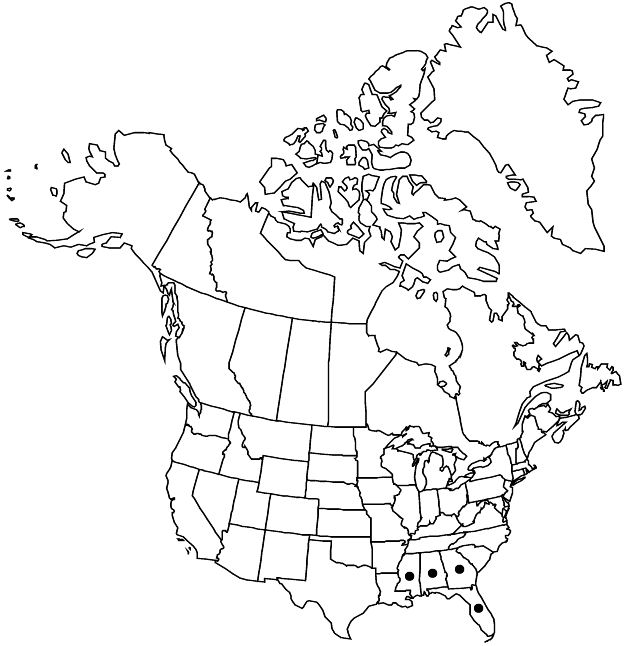Difference between revisions of "Crataegus incilis"
Biltmore Bot. Stud. 1: 41. 1901.
FNA>Volume Importer |
imported>Volume Importer |
||
| (6 intermediate revisions by 2 users not shown) | |||
| Line 15: | Line 15: | ||
|name=Crataegus pulcherrima var. incilis | |name=Crataegus pulcherrima var. incilis | ||
|authority=(Beadle) Lance | |authority=(Beadle) Lance | ||
| + | |rank=variety | ||
}} | }} | ||
|hierarchy=Rosaceae;Rosaceae subfam. Amygdaloideae;Rosaceae tribe Gillenieae;Crataegus;Crataegus sect. Coccineae;Crataegus (sect. Coccineae) ser. Pulcherrimae;Crataegus incilis | |hierarchy=Rosaceae;Rosaceae subfam. Amygdaloideae;Rosaceae tribe Gillenieae;Crataegus;Crataegus sect. Coccineae;Crataegus (sect. Coccineae) ser. Pulcherrimae;Crataegus incilis | ||
| Line 30: | Line 31: | ||
|elevation=20–200 m | |elevation=20–200 m | ||
|distribution=Ala.;Fla.;Ga.;Miss. | |distribution=Ala.;Fla.;Ga.;Miss. | ||
| − | |discussion=<p>The deeply cut trullate leaves of Crataegus incilis, with the acute tips of their triangular lobes in a more or less straight line in the more extreme forms, are very distinctive. The type, and most specimens seen, do not have quite straight-sided lobes as seen in the illustration in J. B. Phipps and K. A. Dvorsky (2006b), and their lobes may therefore be described as more or less narrowly cuspidate. Forms with somewhat more rounded lobes and yellow pomes that might key out here perhaps represent C. concinna Beadle.</p> | + | |discussion=<p>The deeply cut trullate leaves of <i>Crataegus incilis</i>, with the acute tips of their triangular lobes in a more or less straight line in the more extreme forms, are very distinctive. The type, and most specimens seen, do not have quite straight-sided lobes as seen in the illustration in J. B. Phipps and K. A. Dvorsky (2006b), and their lobes may therefore be described as more or less narrowly cuspidate. Forms with somewhat more rounded lobes and yellow pomes that might key out here perhaps represent <i>C. concinna</i> Beadle.</p> |
|tables= | |tables= | ||
|references= | |references= | ||
| Line 39: | Line 40: | ||
-->{{#Taxon: | -->{{#Taxon: | ||
name=Crataegus incilis | name=Crataegus incilis | ||
| − | |||
|authority=Beadle | |authority=Beadle | ||
|rank=species | |rank=species | ||
| Line 54: | Line 54: | ||
|publication year=1901 | |publication year=1901 | ||
|special status=Endemic | |special status=Endemic | ||
| − | |source xml=https:// | + | |source xml=https://bitbucket.org/aafc-mbb/fna-data-curation/src/2e0870ddd59836b60bcf96646a41e87ea5a5943a/coarse_grained_fna_xml/V9/V9_997.xml |
|subfamily=Rosaceae subfam. Amygdaloideae | |subfamily=Rosaceae subfam. Amygdaloideae | ||
|tribe=Rosaceae tribe Gillenieae | |tribe=Rosaceae tribe Gillenieae | ||
Latest revision as of 00:00, 6 November 2020
Shrubs or trees, 40–70 dm. Stems: twigs: new growth reddish green, 1-year old dark red brown, 2-years old dark gray; thorns on twigs ± straight, 2-years old dark brown to blackish, fine, 1.5–3 cm. Leaves: petiole length 40–55% blade, sparsely to densely sessile-glandular; blade trullate to narrowly ovate, 3.5–5.5(–7.5) cm, base cuneate (tapering into distal winged part of petiole), lobes 3 or 4 per side, sinuses deep, max LII 25–50%, lobe apex usually ± narrowly cuspidate, margins dentate, teeth ± distant, subacute, veins 5–7 per side, apex subacute, vein pubescence not recorded. Inflorescences 3–7-flowered; branches glabrous; bracteoles caducous, numerous, linear, membranous, margins glandular. Flowers 14–18 mm diam.; sepals narrowly triangular, 7 mm, margins subentire or glandular-denticulate; anthers pink; styles 3–5. Pomes red or yellow, orbicular, 5–8(–10) mm diam.; sepals wide-spreading; pyrenes 3–5.
Phenology: Flowering Apr; fruiting Sep–Oct.
Habitat: Open woods, woodland margins
Elevation: 20–200 m
Distribution

Ala., Fla., Ga., Miss.
Discussion
The deeply cut trullate leaves of Crataegus incilis, with the acute tips of their triangular lobes in a more or less straight line in the more extreme forms, are very distinctive. The type, and most specimens seen, do not have quite straight-sided lobes as seen in the illustration in J. B. Phipps and K. A. Dvorsky (2006b), and their lobes may therefore be described as more or less narrowly cuspidate. Forms with somewhat more rounded lobes and yellow pomes that might key out here perhaps represent C. concinna Beadle.
Selected References
None.